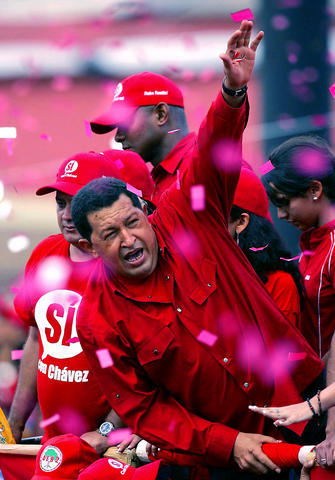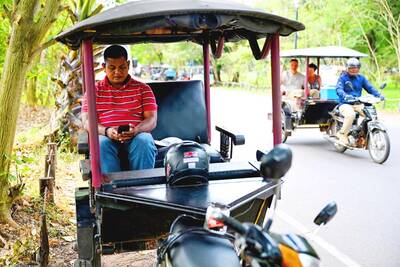AP, CARACAS
Venezuelan President Hugo Chavez said his government could deny permits for opposition-led protests because of violence during demonstrations against proposed constitutional amendments that would let him run for re-election indefinitely.
"The next time they announce one of these marches, we'll have to evaluate whether to grant permission," Chavez told thousands of supporters during a rally on Sunday in favor of the reforms.

PHOTO: AP
He accused his opponents of planning to spur widespread political upheaval ahead of the Dec. 2 referendum on the 69 proposed constitutional changes.
"We're not going to allow them to fill Venezuela's streets with blood," Chavez said.
Human rights groups, the Roman Catholic Church and other critics say Chavez is seeking the changes in order to consolidate power, pointing to the proposed elimination of presidential term limits. Opponents warn that amendments allowing authorities to detain citizens without charge and censor the media during a state of emergency would violate civil liberties.
The president's stern warning came in response to violence last week during street demonstrations by university students protesting the proposed constitutional overhaul. On Friday, two students were killed and four others were injured by gunfire during a protest outside a university in the western state of Zulia.
Chavez condemned the killings and urged political rivals to settle their differences democratically. University students plan more protests this week.
Opposition leader Leopoldo Lopez said Venezuelans would continue protesting against the sweeping reforms, but called for peaceful demonstrations.
"There won't be any police, National Guard troops or armies capable of stopping the country's transformation," he said. "They won't be able to stop Venezuelans who want democracy."
The reforms were overwhelmingly approved last week by the National Assembly, which is controlled by the president's allies. Chavez -- a former paratroop commander who was first elected in 1998 -- denies the amendments threaten freedoms.
The amendments would also give Chavez the power to create provinces governed by federally appointed officials, allow the government to expropriate private property without having to first seek court authorization, create new types of property managed by cooperatives, end the Central Bank's autonomy and extend presidential terms from six to seven years.
Chavez, who won re-election last year with promises to transform Venezuela into a socialist state, says the changes would actually expand democracy by empowering neighborhood-based assemblies.
"It's power for the people," he told cheering supporters. "That's the essence of the constitutional reform."
Venezuela -- a major supplier of oil to the US -- is deeply divided over Chavez's rule, with government opponents fearing an impending dictatorship. But a weak opposition has repeatedly failed to derail his initiatives at the ballot box.
Waving flags and wearing the red of Chavez's ruling party, thousands of "Chavistas" -- as the president's backers call themselves -- shouted pro-reform slogans in a march that stretched for several kilometers before reaching Sunday's rally in downtown Caracas, where Chavez greeted them.

The death of a former head of China’s one-child policy has been met not by tributes, but by castigation of the abandoned policy on social media this week. State media praised Peng Peiyun (彭珮雲), former head of China’s National Family Planning Commission from 1988 to 1998, as “an outstanding leader” in her work related to women and children. The reaction on Chinese social media to Peng’s death in Beijing on Sunday, just shy of her 96th birthday, was less positive. “Those children who were lost, naked, are waiting for you over there” in the afterlife, one person posted on China’s Sina Weibo platform. China’s

‘NO COUNTRY BUMPKIN’: The judge rejected arguments that former prime minister Najib Razak was an unwitting victim, saying Najib took steps to protect his position Imprisoned former Malaysian prime minister Najib Razak was yesterday convicted, following a corruption trial tied to multibillion-dollar looting of the 1Malaysia Development Berhad (1MDB) state investment fund. The nation’s high court found Najib, 72, guilty on four counts of abuse of power and 21 charges of money laundering related to more than US$700 million channeled into his personal bank accounts from the 1MDB fund. Najib denied any wrongdoing, and maintained the funds were a political donation from Saudi Arabia and that he had been misled by rogue financiers led by businessman Low Taek Jho. Low, thought to be the scandal’s mastermind, remains

Australian Prime Minister Anthony Albanese yesterday announced plans for a national bravery award to recognize civilians and first responders who confronted “the worst of evil” during an anti-Semitic terror attack that left 15 dead and has cast a heavy shadow over the nation’s holiday season. Albanese said he plans to establish a special honors system for those who placed themselves in harm’s way to help during the attack on a beachside Hanukkah celebration, like Ahmed al-Ahmed, a Syrian-Australian Muslim who disarmed one of the assailants before being wounded himself. Sajid Akram, who was killed by police during the Dec. 14 attack, and

VISHNU VANDALS: A Cambodian official accused Thailand of destroying a statue in a disputed border area, with video showing the Hindu structure being torn down The Thai military said ceasefire talks with Cambodia, set to begin yesterday, are expected to conclude with a meeting of the countries’ defense ministers on Saturday, as the two sides seek to end weeks of deadly clashes. The talks started at 4pm in Thailand’s Chanthaburi Province, which borders Cambodia. The Thai Ministry of Defense outlined several demands to be discussed ahead of the bilateral meeting of the General Border Committee (GBC) on Saturday. If secretariat-level discussions fail to reach agreement on key technical frameworks such as troop deployments, the Thai side would not proceed with the GBC meeting or sign any agreement on